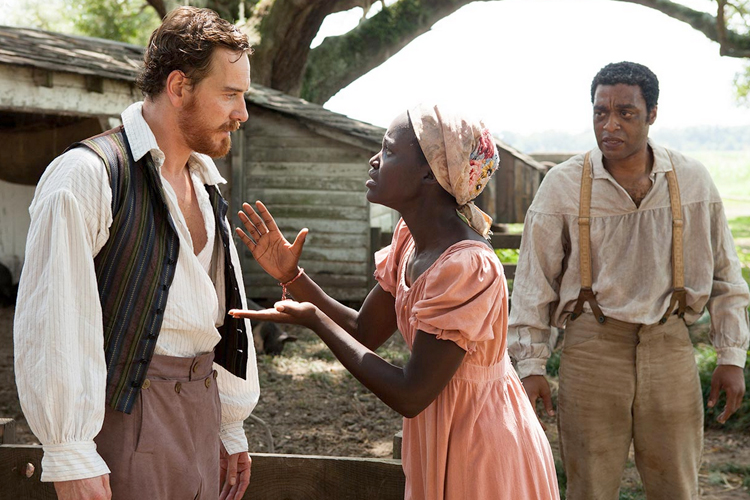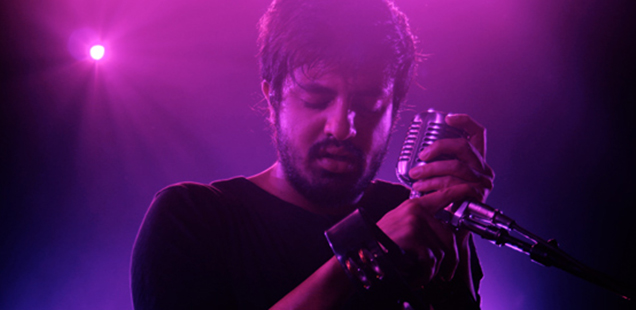Movie Review: ’12 Years a Slave’ Is A Tour de Force

Based on the book of the same name, 12 Years a Slave chronicles the years when Solomon Northrup (Chiwetel Ejiofor) was kidnapped and sold into slavery. Often overlooked at the time of its 1853 publication — and even for decades afterward — it’s the true, first hand account by Northrup. Born free in the north, he was tricked and subsequently kidnapped and sold as a runaway slave. Often brutal, director Steve McQueen (Shame) handles the subject with mastery, able to at once create a direct and accessible film that’s devoid of sentimentality, and never condescends to the audience.
Of course another recent film about slavery comes to mind — Quentin Tarantino’s Django Unchained — but whereas that film found Tarantino rewriting history the way many today wish it could have happened, McQueen sets out to unfold the real, uncensored truth. Many may argue that Solomon Northrup wasn’t an ordinary slave — nor a normal black man of his time for that matter. He was born free, was a professional musician, and lived in peace with his family. But it’s because of his exceptional background, education and, yes, eventual freedom that his story exists while so many others — both slaves and free blacks kidnapped into slavery — will forever be lost. The film succeeds not only because McQueen refuses to sugar coat it or build up Northrup as a Christ-like heroic figure, but because his past visual achievements, which were apparent in both Hunger and Shame, are complemented by a stronger sense of storytelling.
Still, much of the film consists of long, lingering takes of the cruelty Northrup and his fellow slaves were subjected to. Even with some very graphic physical brutality, the most vicious scene may be when Northrup’s most callous master Edwin Epps (Michael Fassbender) wanders into the slaves’ cabin drunk, in the middle of the night, and brings them back to his plantation home to dance for his amusement. It’s no revelation to simply posit the entire enterprise of slavery as pure evil, so McQueen posits it as a much more complicated practice.
Northrup’s first owner William Ford (Benedict Cumberbatch) recognizes his intelligence, applauds it, and treats him as a friend would. It never crosses Ford’s mind, however, to free Northrup despite the strong implication that he doesn’t fully agree with slavery. But for Ford, and other similar sympathizers, slavery is a way of life, even if that way of life is somewhat unagreeable. Slaves can be treated like human beings, but they’re still slaves.
It’s when Northrup ends up under the eye of Epps that the true darkness of slavery becomes uncovered. Epps is prone to read passages from The Bible that he interprets as condoning the act of slavery, beating his slaves for the fun of it, and rape the women, amongst many other despicable transgressions. If Ford is portrayed as a good man in the situation of his times, Epps is painted as the worst of the worst. Only his bitter wife Mary (Sarah Paulson) shows even less remorse than Epps for the psychological and physical pain she shows their slaves. As soulless as Epps can be, underlying his drunken stupors and bouts of insatiable aggression, Fassbender exudes the smallest bit of understanding that maybe his lifestyle will find him going to Hell.
The film’s greatest triumph is creating complexities within the reality of slavery. Even Epps — easily the film’s strongest antagonist — can be sympathized with at times, as infinitesimal as that sympathy may be. It’s a testament not only to McQueen’s superb confidence in his direction and John Ridley’s solid script that the film is layered yet accessible, but also to the across-the-board fantastic acting. Ejiofor gives a career best performance while frequent McQueen collaborator Fassbender also shines. The cast is littered with great performances from Paul Dano, Michael K. Williams, Taran Killam, Brad Pitt, Sarah Paulson, and Benedict Cumberbatch among them, but it’s relative newcomer Lupita Nyong’o’s turn as Patsy, Epps’ slave and disturbing object of affection, who’s the real standout.
If Northrup is the film’s hero and the audience’s connection to the world of slavery, it’s Patsy who represents its stark truths. She becomes the object of Mary’s scorn and twisted jealousy, recognizing her husband’s affection for Patsy. Despite being a slave and literal property of the Epps’, Mary still views Patsy as some sort of competitor, and while it may not seem like a fair competition, there is some truth in Mary’s views. Patsy is the true martyr of the film, constantly out picking her male counterparts in the cotton fields but perpetually starved by Mary and subject to Epps’ bouts of lust.
It’s not always an easy film to watch, even if it’s tamer than one may expect, but McQueen doesn’t go for cheap shots of physical gore. Instead, he aims to illuminate the dark history of slavery in all of its complications. Like the Holocaust, it’s a part of history most want to forget, and McQueen shows it for all the evil that it was. That doesn’t mean, however, that there weren’t moments of radiance, fleeting as they were, and it sometimes brought a deeper understanding of the nature of humanity, if only in direct correlation to its wrongness. McQueen crafts a film that’s able to bring insight to the greater aspects of the American slave trade by focusing on its details.
Rating: 4.5 out of 5




